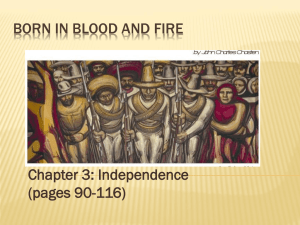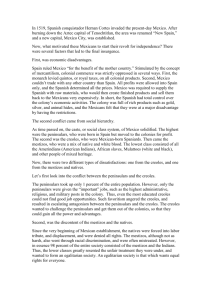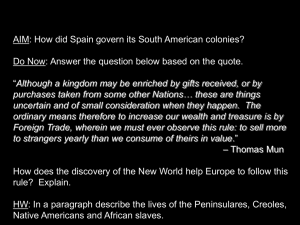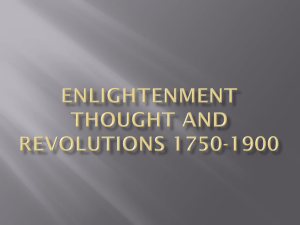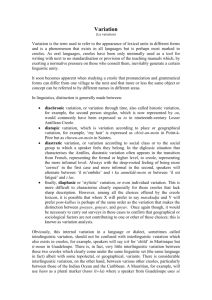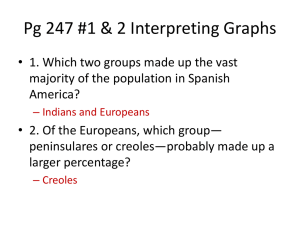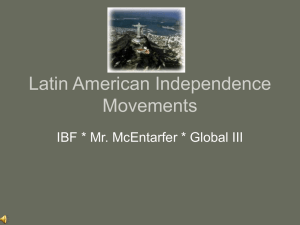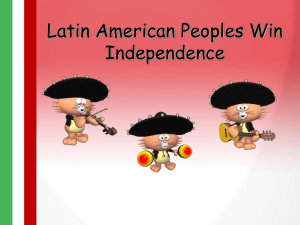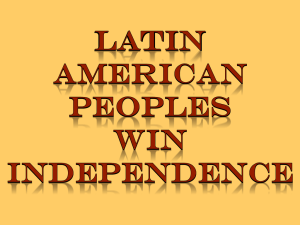BORN IN BLOOD AND FIRE: a concise history of Latin America by
advertisement
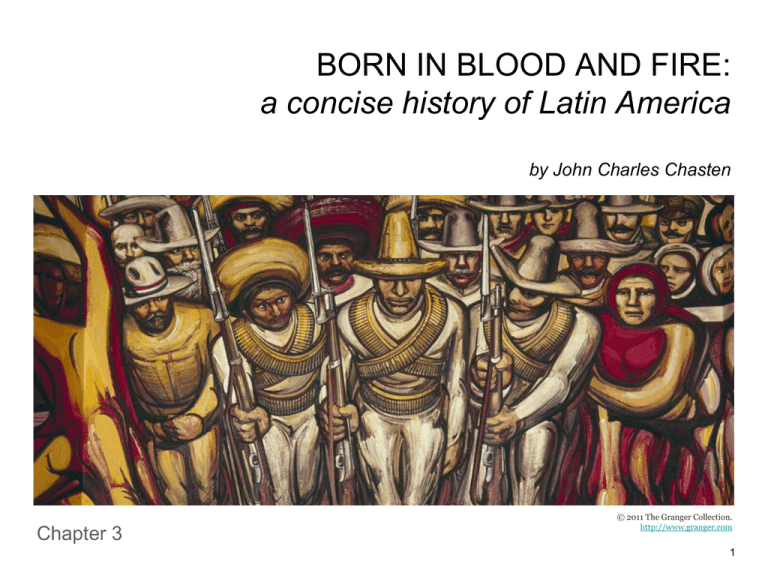
BORN IN BLOOD AND FIRE: a concise history of Latin America by John Charles Chasten Chapter 3 © 2011 The Granger Collection. http://www.granger.com 1 Chapter 3: Independence Key questions from Chapter 3: 1.What was the context within which the revolutions began? 2.What ideas and events influenced the rebellion? 3.Who was and was not involved? How? 4.How did the outcomes of the revolutions match the founding ideals? Chapter 3: European context Bad governance in Spain •Carlos IV drove state into bankruptcy •Increased taxes and sale of political office for revenue •Resentment among Spanish Americans Violence and invasion •Napoleonic Wars (1799-1815) •Imprisonment of Spanish king gave colonies de facto independence Chapter 3: European ideals fly across the Atlantic liberalism & sovereignt y France Spain Americas Chapter 3: Social hierarchies and revolutionary cries Creoles (native-born, of Spanish blood): Peninsulars (Spanish- born): •Rebels •Loyalists •Social •Selected competition made creoles resentful of peninsulars. •Greater in number than peninsulars to rule colonies •Smallest demographic Natives, Africans, mixed-races: •Rebels, maybe •Uninterested in social concerns of creoles •Resentful of creoles and peninsulars •Largest demographic Slaves: •?????? What was at stake for each of these groups? Chapter 3: American rebellions begin...slowly Mexico •Hidalgo inspired peasants, but “too indigenous” for the creoles. •Father Morelos, a mestizo, energized creoles and lower classes. Peru •Tupac Amaru II’s revolt of 1780s scared them away from uniting natives. The Fringes: Venezuela and Argentina •Both countries had active creole movement against Spanish. •Movements helped by experienced horsemen. ¡Viva la revolución! Chapter 3: Uniting creoles and natives against Spain Creoles found themselves in a pickle... “Nativism” •Too few creoles for a successful “them”. •Birthplace distinguished “us” from •Creoles, mestizos, and natives were revolution •Considered indigenous rebellion to be now “Americanos”. dangerous •Peninsulars were not Americanos. •Needed to unify with lower classes to •Now “Americanos” vs. “Spainish” oppose the Peninsulars. Creoles Americanos vs. Spanish Chapter 3: What about Brazil? Background: •King Jão had been living in Brazil to escape Napoleon. Brazilian beaches... •Jão left son to rule over Brazil when forced back to Portugal. •New leader declared “Empire of Brazil” Key differences: •No need to fight the king -- the king declared independence! •Imperial armies loyal to Portugal too small to oppose declaration of independence. If you were King Jão, would you want to leave? Chapter 3: The liberators Simon Bolívar •Began revolutions in Venezuela, then moved on to Ecuador •Finished the work of San Martín after he fled to Europe José de San Martín •Launched surprise attack from Argentina through Chile •From Chile, captured Lima in Peru •Made his way towards the center of the continent, but had to flee •Bolívar finished the liberation in highlands. Chapter 3: An unfinished revolution? New hat, same system: • Patriarchy • Classism • Racism Spanish control Elite control Chapter 3: Was Bolívar the Latin American George Washington? Let’s ask George Bush and Hugo Chávez! http://www.youtube.com/watch?v=_B8VpHJvS08&feature=player_embedded&safety_mode=true&persist_safety_mode=1 Chapter 3: Vocabulary • Popular sovereignty • Legitimacy • Nativism • Americanos
